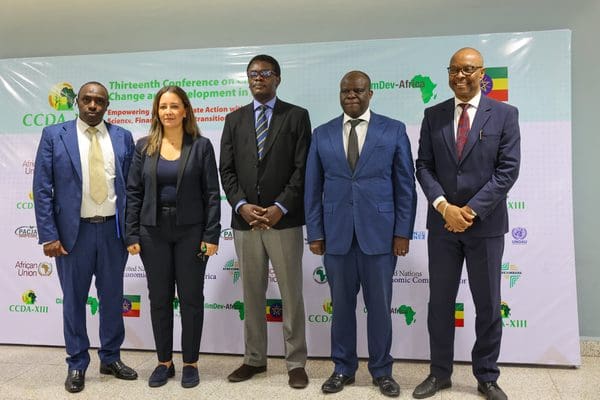Continental leaders seek US$3 trillion funding shift at Ethiopia conference
African climate negotiators demanded a fundamental transformation of global climate finance Friday, calling for science-driven solutions and nearly $3 trillion in funding by 2030 to address the continent’s escalating environmental crisis.
The African Group of Negotiators and Pan African Climate Justice Alliance issued their demands at the 13th Conference on Climate Change and Development in Africa, challenging international partners to recognize African scientific expertise and dramatically increase financial commitments.
Continental leaders argued that current climate frameworks inadequately serve Africa’s needs, with the continent receiving only 3 to 4 percent of global climate finance flows despite facing disproportionate climate impacts affecting over 110 million people in 2024 alone.
The three-day conference in Ethiopia’s capital brings together government officials, researchers and civil society organizations under the theme “Empowering Africa’s Climate Action with Science, Finance, and Just Transition” ahead of crucial international climate negotiations.
Dr. Richard Muyungi, chair of the African Group of Negotiators, challenged the continent’s historical dependence on external climate data and models. According to conference organizers, Muyungi emphasized that African scientific institutions must lead rather than follow in developing climate solutions tailored to continental conditions.
“Climate finance is not charity, but it is a right, a duty, and a measure of trust,” Muyungi declared, directly challenging developed nations to meet obligations to climate-vulnerable regions.
His remarks reflect growing frustration among African policymakers with climate frameworks developed primarily in Western institutions that often fail to capture the continent’s unique ecological and social dynamics.
Mithika Mwenda, executive director of the Pan African Climate Justice Alliance, highlighted the stark mathematics of climate inequality facing African nations. According to alliance calculations, achieving continental climate goals requires close to $3 trillion by 2030, representing a massive increase from current funding levels.
The funding gap underscores fundamental injustice in global climate architecture, where Africa contributes least to historical greenhouse gas emissions while bearing disproportionate consequences through droughts, floods and extreme weather that devastate agriculture-dependent economies.
Mwenda identified exclusion of Africa’s most vulnerable populations from decision-making processes as among the biggest failures in global climate action. The alliance demands structural reforms in international financial architecture and full access to the Loss and Damage Fund established at previous climate conferences.
Climate disasters affected more than 110 million Africans in 2024, primarily through flooding across the Sahel region, severe droughts in Southern Africa and unprecedented heatwaves that destroyed agricultural lands in northern regions.
These impacts disproportionately affect rural communities dependent on rain-fed agriculture, women bearing primary responsibility for water collection and food security, and youth facing limited economic opportunities as climate change disrupts traditional livelihoods.
Conference participants are developing comprehensive strategies combining immediate adaptation needs with long-term sustainable development goals, recognizing that climate action must deliver economic opportunities rather than impose constraints on African growth aspirations.
The gathering serves as crucial preparation for upcoming international climate negotiations, including COP30 scheduled for Brazil, where African negotiators hope to secure enhanced commitments from developed nations.
Recent negotiations have fallen short of African expectations, with international climate finance targets settling at lower levels than the $3 trillion developing countries initially demanded. African negotiators argue these compromises inadequately address continental vulnerability and adaptation requirements.
Continental leaders challenged narratives portraying Africa merely as climate victim, instead showcasing innovations demonstrating leadership potential in renewable energy, sustainable agriculture and ecosystem restoration across multiple countries.
Examples include Morocco’s massive solar installations, Kenya’s geothermal energy program and Ethiopia’s extensive reforestation initiatives that have restored millions of hectares while providing economic opportunities for rural communities.
These success stories form the foundation for arguments that Africa possesses expertise and innovation capacity to lead global climate solutions, provided adequate financial resources become available for scaling proven technologies and approaches.
The conference concludes Sunday with commitments expected on research collaboration, technology transfer and advocacy strategies for international negotiations. African leaders hope unified continental positions will strengthen their negotiating power in global climate forums.
For continental climate advocates, the Addis Ababa conference represents a potential turning point where Africa transitions from climate victim to climate leader, provided international partners recognize the continent’s central role in global environmental stability.
The stakes extend beyond Africa’s borders, as the continent’s forests, agricultural systems and renewable energy potential remain crucial to global climate stabilization efforts affecting every nation on Earth.
Source: newsghana.com.gh











